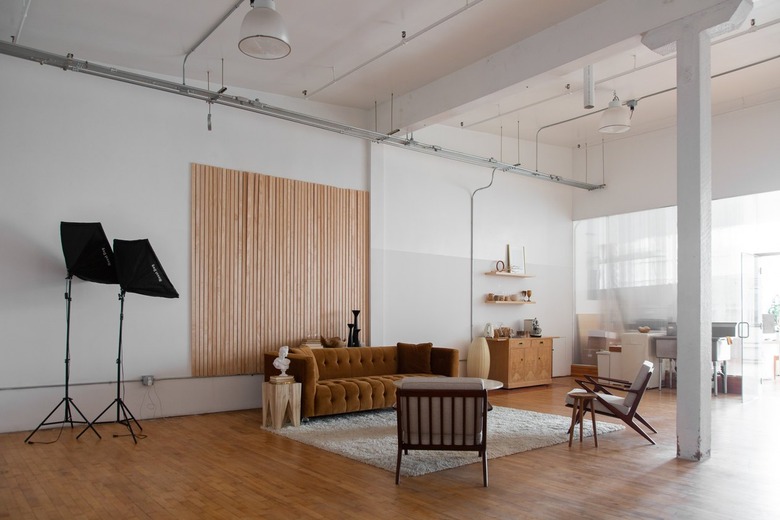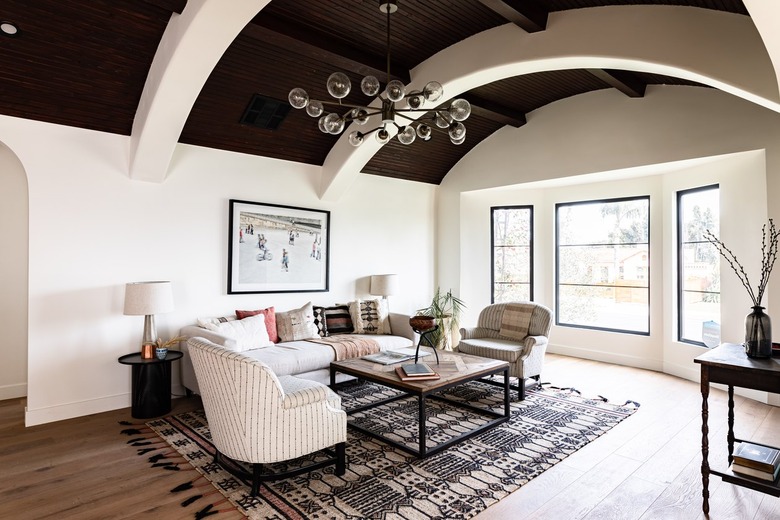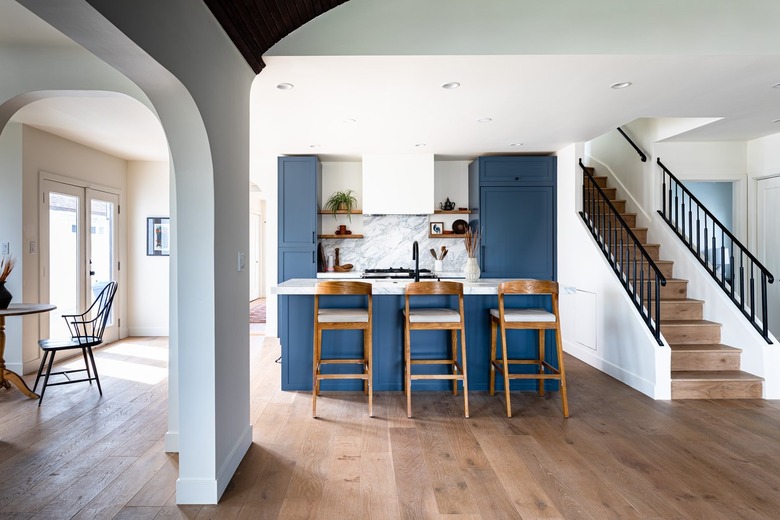How Much Does Hardwood Floor Installation Cost? (And How To Hire For The Job)
Pet claws, kids' ride-on toys, and furniture can take a toll on your once-beautiful hardwood flooring or other flooring surfaces. Your floors make a big first impression when someone walks into the room, so if your current flooring is boring or worn, it's time for a refresh. New hardwood floors lend a natural look to the room and can increase the value of your home. Choosing the right hardwood floor installer gives you professional results.
Ready to hire professional hardwood floor installation? Here's how much to budget — and how to hire for the job.
Tip
Hardwood floors typically cost between $6 and $12 per square foot for the materials and installation, but the price can be much higher depending on the type of flooring you choose and the complexity of the project.
Hardwood Flooring Cost
Hardwood Flooring Cost
The typical hardwood flooring cost is between $6 and $12 per square foot, with the total job typically costing between $2,492 and $6,761. The national average cost is $4,539, but higher-end flooring products hike up the price significantly, with some options reaching up to $25 or more per square foot. A real parquet floor typically has a price range between $20 and $45 per square foot. The labor portion typically runs between $3 and $5 per square foot for prefinished or $5 to $10 for unfinished flooring with the rest going toward the material costs.
The main variation in total cost is the price of the flooring material itself and the total square footage you're having installed. To get a rough estimate of your square footage, use a tape measure to measure the width and length of the room and multiply those numbers. Multiply that number by the estimated cost per square foot and you'll get a general range for your project.
Keep in mind, however, that other pricing variations depend on the type of flooring or service you have performed. Here are a few types of cost and installation factors you should consider before you choose:
Prefinished vs. Unfinished Wood
The average prices for prefinished (or completely stained and sealed hardwood floors) versus unfinished solid hardwood flooring work out to be about the same in the end. Generally, traditional hardwood flooring that comes unfinished is cheaper to buy than prefinished flooring.
However, what you save in material costs you'll pay more in labor since your flooring contractor has to sand and finish the wood once it's installed. Expect to pay an extra $2 to $5 per square foot for labor costs if you choose unfinished hardwood floors.
Engineered Wood Flooring
An engineered wood floor looks similar to a solid wood floor, but it has layers of softwood or high-density fiberboard beneath a hardwood veneer. Installation options for engineered wood flooring include nailing, gluing, or floating floor installation. It typically takes less expertise to install and is therefore a bit cheaper. Price ranges for engineered flooring can vary depending on the type:
- Basic: Between $4.50 and $9 per square foot
- Midrange: Between $6 and $12 per square foot, similar to a hardwood floor
- High end: Between $9 and $16 per square foot
Refinishing Hardwood Floors
If your home already has hardwood floors that are in good condition with only minor scratches or light damage, having the floors sanded and refinished is an option. Professional refinishing typically costs between $1,075 and $2,490, or about $3 to $8 per square foot. Complex jobs can cost up to $4,000 if they require more work for the flooring contractors.
Screening and Recoating Floors
If your current solid wood flooring is just a little dull or has minor scratches in the finish only, a screening and recoating process is an option. This means you just abrade the top of the surface finish (typically polyurethane) using a special clog-resistant screen sanding disk, which doesn't actually sand or remove any of the wood.
Having your floors professionally screened and recoated can range from 90 cents to $1.50 per square foot or more for complex jobs.
Other Pricing Factors
Anything that makes the job more complex or time-consuming increases the wood flooring cost. Harder woods are more difficult to work with and can cost more to install. This includes many exotic hardwood species, such as teak and Brazilian walnut. Other things that can create additional costs include:
- Subfloor damage: Your new hardwood flooring needs a sturdy subfloor for proper installation. It can cost another $500 to $800 if yours needs to be replaced.
- Floor joist damage: Even more expensive is extensive floor joist damage. You can spend $40 to $60 per square foot to have the joists reinforced.
- Room layout: A complex layout can bump up the price a little. An odd shape, lots of closets, or other features that create more work for the contractor can increase the cost.
- Intricate designs: Standard installation is relatively straightforward, but angled installation patterns, such as a herringbone pattern, can cost more due to the extra work to cut and position the pieces.
What a Hardwood Floor Installer Does
What a Hardwood Floor Installer Does
Hardwood flooring contractors handle the complete installation process, including removing the existing flooring, preparing the subfloor and underlayment, installing the hardwood flooring, and finishing the wood. They evaluate the current flooring and provide estimates before completing the work.
Flooring contractors can also sand and refinish old flooring if you have existing hardwood floors that need a makeover. You can do it yourself, but sanding the flooring just right can be tricky. It's easy to gouge the wood or remove too much of the wood grain and damage the floors. Professionals often have a dustless or low-dust option that cuts down on how much dust accumulates in your home during the sanding process.
A flooring specialist can also help you decide on the best flooring options, which can include choosing from exotic woods and more traditional options, like heart pine, hickory, and red oak flooring. They can make recommendations for the best options for durability in high-traffic areas and special concerns, such as moisture resistance.
Doing Your Homework
Doing Your Homework
Before you hire a wood floor installer, there are just a few things you should investigate to make the project go more smoothly.
Hardwood flooring comes in both factory-finished and unfinished options. Prefinished flooring is common and is already stained and finished with your chosen protective coatings, meaning you can walk on it immediately after it's installed. Unfinished, also called site-finished, hardwood flooring offers more options for customization with the colors and finishes, but you won't be able to walk on it or use the room until it has time to dry.
The hardwood flooring installation for prefinished and unfinished wood is similar, with the contractor preparing the subfloor, cutting the pieces as needed, and nailing them in place. With site-finished floors, the process is longer because the contractor also has to sand the floor boards and apply the customer's chosen finishes to the wood.
Whether the floors come prefinished or unfinished, it's important to understand the type of finishes available. Stain is only used to add color to the natural hardwood appearance and doesn't protect the wood. Protective coatings can be surface finishes, which form a protective film on top of the wood, or penetrating finishes, which soak into the wood pores and harden to create a lasting finish. Polyurethane is the most common option for sealing wood floors because it creates a stain- and moisture-resistant barrier over the wood, but it also leaves behind a somewhat plasticlike look.
It's a good idea to see finished floors inside actual homes rather than relying on small samples before you choose your flooring type and finishes. It can be difficult to see the color variation, wood grain, and overall look and feel of different flooring types and finishes from a small sample in a showroom.
Why Hire a Hardwood Floor Installer
Why Hire a Hardwood Floor Installer
The type of flooring you choose often determines whether you need a professional floor contractor to handle the installation. While it can be installed by homeowners, solid hardwood flooring is more complicated to install than click-together laminate or engineered wood flooring. By hiring a professional, you ensure the flooring is installed correctly and looks beautiful without breaking a sweat yourself.
Some benefits of hiring a hardwood floor installer include:
- Less waste of materials, which can lower overall materials costs
- Understanding of proper hardwood flooring installation techniques and best practices
- Proper preparation, including a strong, level subfloor to support the flooring
- Expertise with sanding and finishing, which is not something many homeowners possess
- Experience in common installation issues, such as a room that's not square
- Faster turnaround time with efficient installers who already know how to install the flooring properly
Choosing the Right Hardwood Floor Installer
Choosing the Right Hardwood Floor Installer
Finding the right hardwood floor installer requires a little research. You can either buy the flooring through the contractor or buy it separately and hire someone to install it. Either way, you need installers who are experienced and follow best practices for hardwood flooring installation.
Use these tips to help you choose a flooring contractor:
- Obtain personal recommendations: One of the easiest ways to narrow your search is to ask people you know for flooring contractor recommendations. They'll give you honest feedback on the quality of work and whether they would use the company again. Asking at a home improvement store can also give you a good starting point for recommended contractors.
- Check flooring options: Ask if you can provide the wood flooring or if you have to use the company's products. Check the flooring options if you're getting it from the installer to make sure the type, quality, and finishes you want are available.
- Get detailed, written bids: Get written bids from at least three contractors to compare the options. Ask for itemized bids so you can see the breakdown for materials and labor, including costs for the flooring, removal of old flooring, installation of hardwood, and labor to finish the flooring if applicable. Request a copy of the contract as well to learn the details of what's included and what you can expect.
- Request proof of insurance: Flooring contractors should have liability and workers' compensation insurance to cover them while working in your home. Ask for a copy of the insurance certificate and follow up with the insurance company to make sure the policy is still active.
- Explore credentials: Ask about the qualifications of the installer, including experience and certifications, such as those awarded by the National Wood Flooring Association.
- Check references: Even if someone you know recommends the company, ask for and check with other references. This helps you gauge the quality of the installation services and can help you spot red flags.
- Look online: References provided by the company will likely be positive, but online reviews and ratings can give a more honest view if something isn't right. Look on Yelp, Google business reviews, and similar review sites to check out the overall rating and specific comments from past clients.
- View past work: If possible, check out the contractor's hardwood floor installation work in person. Online photos aren't always accurate, so getting a firsthand look lets you assess the quality of the installation.
- Compare warranties: Look at the warranty options and guarantees offered by each contractor to ensure you're covered if something goes wrong or doesn't last.
- Ask questions: Dig deeper about contract issues or estimates. Ask about things like payment options, when the company is available, how long the job will take, and other issues that come up as you're talking to companies. If you're having them finish the floor in your home, ask how long you'll need to stay off the floors.
Hardwood Flooring Installer Certification
Hardwood Flooring Installer Certification
Proper hardwood floor installation is essential to get the show-stopping results you want. The National Wood Flooring Association (NWFA) offers well-respected installation guidelines for solid wood flooring. Installers and refinishers can take a test to become NWFA certified. They have to complete continuing education to remain certified. Choosing an NWFA-certified installer is an easy way to ensure that you're hiring a highly qualified professional for the job.
References
- HomeAdvisor: How Much Does Hardwood Flooring Cost?
- HomeAdvisor: How Much Does It Cost to Refinish Hardwood Floors?
- National Wood Flooring Association: The Homeowner's Handbook to Real Wood Floors
- Bob Vila: How Much Does Hardwood Flooring Cost?
- National Wood Flooring Association: Find a Certified Professional


